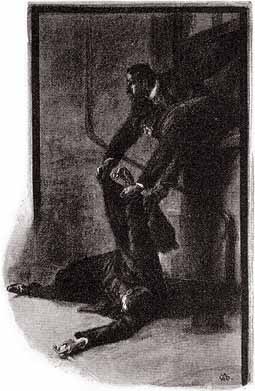| The Bruce-Partington Plans 9 | The Dying Detective 1 |
“He had his suspicions before, and he followed me as you describe. I never knew it until I was at the very door. It was thick fog, and one could not see three yards. I had given two taps and Oberstein had come to the door. The young man rushed up and demanded to know what we were about to do with the papers. Oberstein had a short life-preserver. He always carried it with him. As West forced his way after us into the house Oberstein struck him on the head. The blow was a fatal one. He was dead within five minutes. There he lay in the hall, and we were at our wit’s end what to do. Then Oberstein had this idea about the trains which halted under his back window. But first he examined the papers which I had brought. He said that three of them were essential, and that he must keep them. ‘You cannot keep them,’ said I. ‘There will be a dreadful row at Woolwich if they are not returned.’ ‘I must keep them,’ said he, ‘for they are so technical that it is impossible in the time to make copies.’ ‘Then they must all go back together to-night,’ said I. He thought for a little, and then he cried out that he had it. ‘Three I will keep,’ said he. ‘The others we will stuff into the pocket of this young man. When he is found the whole business will assuredly be put to his account. I could see no other way out of it, so we did as he suggested. We waited half an hour at the window before a train stopped. It was so thick that nothing could be seen, and we had no difficulty in lowering West’s body on to the train. That was the end of the matter so far as I was concerned.”

“And your brother?”
“He said nothing, but he had caught me once with his keys, and I think that he suspected. I read in his eyes that he suspected. As you know, he never held up his head again.”
There was silence in the room. It was broken by Mycroft Holmes.
“Can you not make reparation? It would ease your conscience, and possibly your punishment.”
“What reparation can I make?”
“Where is Oberstein with the papers?”
“I do not know.”
“Did he give you no address?”
“He said that letters to the Hôtel du Louvre, Paris, would eventually reach him.”
“Then reparation is still within your power,” said Sherlock Holmes.
“I will do anything I can. I owe this fellow no particular good-will. He has been my ruin and my downfall.”
“Here are paper and pen. Sit at this desk and write to my dictation. Direct the envelope to the address given. That is right. Now the letter:
“DEAR SIR:
“With regard to our transaction, you will no doubt have observed by now that one essential detail is missing. I have a tracing which will make it complete. This has involved me in extra trouble, however, and I must ask you for a further advance of five hundred pounds. I will not trust it to the post, nor will I take anything but gold or notes. I would come to you abroad, but it would excite remark if I left the country at present. Therefore I shall expect to meet you in the smoking-room of the Charing Cross Hotel at noon on Saturday. Remember that only English notes, or gold, will be taken.
That will do very well. I shall be very much surprised if it does not fetch our man.”
And it did! It is a matter of history – that secret history of a nation which is often so much more intimate and interesting than its public chronicles – that Oberstein, eager to complete the coup of his lifetime, came to the lure and was safely engulfed for fifteen years in a British prison. In his trunk were found the invaluable Bruce-Partington plans, which he had put up for auction in all the naval centres of Europe.
Colonel Walter died in prison towards the end of the second year of his sentence. As to Holmes, he returned refreshed to his monograph upon the Polyphonic Motets of Lassus, which has since been printed for private circulation, and is said by experts to be the last word upon the subject. Some weeks afterwards I learned incidentally that my friend spent a day at Windsor, whence he returned with a remarkably fine emerald tie-pin. When I asked him if he had bought it, he answered that it was a present from a certain gracious lady in whose interests he had once been fortunate enough to carry out a small commission. He said no more; but I fancy that I could guess at that lady’s august name, and I have little doubt that the emerald pin will forever recall to my friend’s memory the adventure of the Bruce-Partington plans.
| The Bruce-Partington Plans 9 | The Dying Detective 1 |